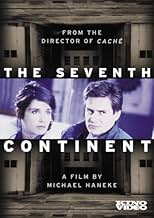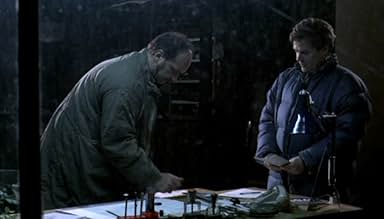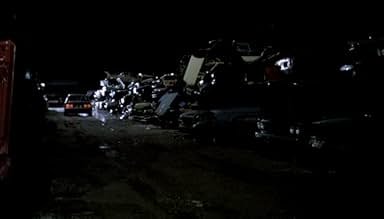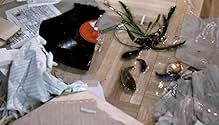Una familia europea que planea escapar a Australia, parece atrapada en su rutina diaria, solo preocupada por incidentes menores. Sin embargo, detrás de su aparente calma y existencia repetit... Leer todoUna familia europea que planea escapar a Australia, parece atrapada en su rutina diaria, solo preocupada por incidentes menores. Sin embargo, detrás de su aparente calma y existencia repetitiva, en realidad están planeando algo siniestro.Una familia europea que planea escapar a Australia, parece atrapada en su rutina diaria, solo preocupada por incidentes menores. Sin embargo, detrás de su aparente calma y existencia repetitiva, en realidad están planeando algo siniestro.
- Dirección
- Guionistas
- Elenco
- Premios
- 2 premios ganados y 1 nominación en total
- Self
- (material de archivo)
- (sin créditos)
- Dirección
- Guionistas
- Todo el elenco y el equipo
- Producción, taquilla y más en IMDbPro
Opiniones destacadas
The Seventh Continent was the second Michael Haneke film I had seen after The Piano Teacher. While I do not think that it is as honest a film as The Piano Teacher, I do applaud the fearless dynamic of the film to be completely devoid of style and of typical film conventions in order to depict a world that grows increasingly unpredictable and harrowing. The film is very Hitchcock-like in how it slowly and quietly builds it's themes involving desolate emotions. It is a tremendously scary film, but it is scary in a way that comes off a lot stronger after the film has finished and you allow it's images to swim around in your head for a while. The loss of passion and of feeling in a human being, to my knowledge, has never been depicted in such a pessimistic way.
This is a very angry film. This is a very resentful film. This is a film that celebrates sadness and anger and I hated watching it. When the film finds time to depict humanity, it writes it off like it is useless. What makes me even more angry about the film, in a way, is how you can almost feel Haneke behind the camera feeling resentful and wanting to punish the audience for wanting to view a film with a good story and a moving and engaging plot. Haneke goes so far out of his way to provide nothing in the way of narrative power and instead opts to craft an angry and traumatizing film. What makes the film work is it's power to provide some deeply haunting imagery and some truly worthwhile substance that I couldn't help but appreciate. Two of these three characters have complete control over everything that happens and they obviously feel that what they do in the final act of the film is most beneficial. Who am I to judge their own control over their lives. What pisses me off is how simple minded they are as characters. I just feel that Haneke prefers to emphasize these problems that these characters share, and what I am bothered by was that he didn't make it less obvious.
Overall, it's not one of Haneke's best films, but for a debut theatrical picture it is about as good as one can get. What strikes me as rather unusual about this film, when compared to his other films, is how it suffers from the same major problems that pretty much all of his films have. For example, he has never been able to build any sympathy with any of his characters, at least from the films of his that I've seen, and this film is no different in that regard. The film of his that I personally think suffers the most from it is Funny Games (both versions). With his picture Cache, it only became a problem early on in the film, and in Benny's Video and Hour of the Wolf it helped add to the atmosphere while damaging the humanity of the films in question. I think that The Seventh Continent shows plenty of promise with Haneke and is extremely riveting at times, but it's easily the absolute worst place to start if you are interested in getting into his films. It will not leave you with a good impression of his work, and only after watching Funny Games and Cache (his most easily accessible films in my opinion) will you be able to catch his reoccurring themes.
The Schobers, husband George (Dieter Berner), wife Anna (Birgit Doll), and daughter Eva (Leni Tanzer), are the happily married family living next door. George is an engineer and Anna an optician. Eva is a bright child of about eight with deep, expressive eyes. The family moves through their morning ritual with precision -- brushing their teeth, feeding the fish, and eating breakfast with little conversation or emotional interaction. The camera avoids their faces, focusing on mundane objects such as a bowl of cereal, an alarm clock, a fish tank, a package of congealed broccoli. This preoccupation with objects underscores the lack of connection between the characters and the things they have acquired. We get our first hint that something is not right when Eva pretends to her teacher that she has lost her eyesight. Anna questions her about the incident, promising not to harm her if she tells the truth but, when Eva admits to the lie, suddenly slaps her across the face ignoring the fact that she is a very troubled little girl. It is from here that the cracks begin to widen.
Depicting ritualistic actions like counting of money at a supermarket, the distractions of television, the meaninglessness of work, the film reflects the powerlessness and isolation of people in modern society. Haneke chronicles a family enslaved to the structures they have created, operating in a morass of emotional vacuity. The first hour may seem slow but it builds considerable tension until it reaches a shattering climax. Little by little the family disengages. George quits his job and writes letters to his parents hinting of something dark about to happen. In the absence of a spiritual core, without the possibility of meaningful action, the family sinks deeper into an abyss, unraveling and discarding the tightly woven structures of their life. Similar in theme to Todd Haynes' 1995 film Safe but with three times the power, The Seventh Continent is a ruthlessly intelligent film that burns its way into your psyche, leaving an indelible mark that will forever haunt your dreams.
The film wasn't totally a let down however; far from it. The last 45 minutes really picks up intensity and re-grabs the viewer's interest. I won't spoil anything for those who haven't seen it, but the scene in which the family destroys their own house and possessions is extremely well done. The ending is bleak and depressingly powerful, and I realized that it wouldn't have worked without the boring first hour. But that doesn't change the fact that it was boring.
Overall, I had trouble giving this film a number rating, but I guess it would be somewhere around a 6/10. I think it's possible that that number would change on a second viewing, but to be honest, I doubt I would ever want to watch this film again.
It is amazing how a masterpiece needs no soundtrack, fancy camera work or explicit and extended dialogs.
Unfortunately, it is very hard to find. The screenings are rare and no personal editions on VHS or DVD exist as far as I am aware. Many will recognize the "Piano Teacher" approach to directing but, this is as powerful as it can get. One of the finest examples of style not overlapping form.
Treat yourself with this lesson. Watch it if you can. Specially if you experienced depression at a given time in your life.
¿Sabías que…?
- TriviaBased on real events.
- Citas
Georg Schober: We have to cancel the newspaper subscription
Anna Schober: Mhm
- ConexionesFeatured in Selección TCM: Michael Haneke (2012)
- Bandas sonorasSend Me Roses
(uncredited)
Written by Günter Mokesch and Karin Raab
Performed by Günter Mokesch and Karin Raab
Selecciones populares
- How long is The Seventh Continent?Con tecnología de Alexa
Detalles
Contribuir a esta página



























